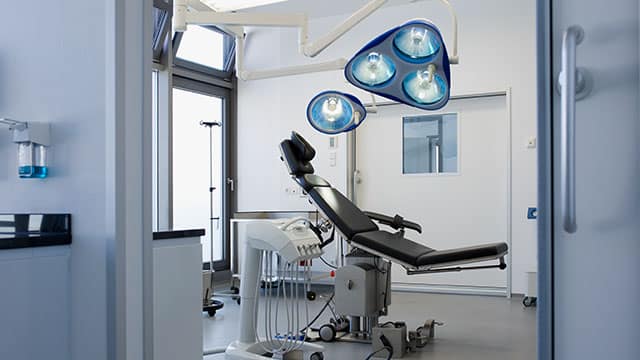So, how can those without insurance and people who can't afford co-pays and out-of-pocket minimums get quality, affordable dental care? Fortunately, many low-cost options exist for those who think seeing dental professionals is beyond their budgets. In fact, with all of the free or low-cost dental services and programs presented below, everyone in the U.S. should be able to get a dental checkup at least once a year — and specialized dental procedures as needed.
Dental and Dental-Related Schools
One of the best ways to find affordable or free care is to seek out a university or dentistry school closest to you. Most have clinics where faculty and supervised students provide care at a reduced cost – typically based on a sliding income scale – or for free.
Luckily, the American Dental Association (ADA) has a great tool to find a U.S. accredited school near you. You can search by city, state, and type of treatment you need.
Once on the school's website, search for "dental" and "clinic" – along with other keywords – to pull up the web page. Then, you can check out if the clinic:
- Offers the dental treatment you need – specialized care (like orthodontics), certain dental procedures (like root canals), and services (like dentures)
- Lists certain days, hours, and even times of the month when the school offers the care you're seeking
- Requires appointments or serves the public on a first-come, first-served basis
The ADA tool also lets you find accredited dental hygienist schools that provide free or low-cost checkups and dental cleanings. These schools might also be in smaller cities near you. Getting basic dental care will help you prevent tooth decay and gum disease.
Local Free or Low-Cost Dental Health Clinics
Go to the sites below or check with local social service agencies for referrals to these clinics, which are usually funded by city, county, state, federal, and/or charitable funds:
- The U.S. Department of Health and Human Services provides a directory for low-cost or free clinics receiving federal funds. Visit your state and local government websites to find listings of other clinics near you.
- The National Association of Free and Charitable Clinics provides a search tool for dental and medical care clinics for underserved communities, including people in dental "deserts" and low-income people with or w/o insurance.
Here are a few things to know about these clinics
- Many offer checkups, dental cleanings, fillings, and crowns at a minimum. Some clinics provide root canals and more in-depth dental work.
- Because payment options vary, it's best to determine beforehand if a clinic and its services are free, require fees on a sliding income scale, or take insurance like Medicare.
- Many require proof of income. So, you'll want to bring a recent pay stub, tax form, or letter from your employer to qualify.
Dental Care Foundations
Keep in mind several charitable organizations donate their resources to affordable and pro-bono care. The dental professionals associated with these foundations practice at local clinics full-time or offer makeshift clinic days for the basic cleaning and dental work you need every six months. Some foundations provide dental care for specialized procedures, extreme cases, emergencies, and special needs.
Among foundations offering dental care are:
- Give Back a Smile, the American Academy of Cosmetic Dentistry's charitable foundation provides free restorative dental services to adults who've suffered dental trauma resulting from sexual and domestic violence.
- Colgate Bright Smiles, Bright Futures®, provides free dental screenings and oral health resources to underserved children via mobile vans.
- Give Kids A Smile® is the American Dental Association (ADA) initiative providing free and low-cost dental screenings, treatment, and preventive care to kids with little or no access to oral health care.
Your local social service agencies can direct you to other foundation resources.
Student Discounts or Promotional Rates
Sometimes, dentist offices can help out. Ask your regular dental provider about special rates and discounts, especially if you're a student. And if you attend a college or university, you can also seek out your campus health clinic for information or treatment.
Your dental provider might be able to help you by:
- Referring you to foundations for financial support if your family has a unique dental need.
- Working out a payment plan or financing before a dental procedure.
Of course, if you practice good hygiene practices at home, you can save money on dentistry procedures. So, brush twice daily, clean between your teeth and rinse daily, eat a tooth-healthy diet, and give up smoking. Then, you need to visit a dentist's office or dental clinic regularly, where we hope you'll get a good report on your dental health.
Finding free or affordable dental services takes some time and a little effort, but dental care to fit your budget is out there. Decide if a dental school, government and non-profit dental clinic, or dental discounts meet your and your family's oral care needs. You can then have some peace of mind – and show off a healthy smile.
Oral Care Center articles are reviewed by an oral health medical professional. This information is for educational purposes only. This content is not intended to be a substitute for professional medical advice, diagnosis or treatment. Always seek the advice of your dentist, physician or other qualified healthcare provider.
ORAL HEALTH QUIZ
What's behind your smile?
Take our Oral Health assessment to get the most from your oral care routine
ORAL HEALTH QUIZ
What's behind your smile?
Take our Oral Health assessment to get the most from your oral care routine















